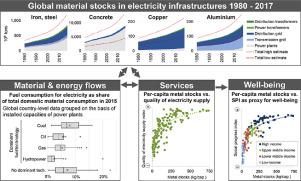Resources, Conservation and Recycling ( IF 11.2 ) Pub Date : 2021-06-19 , DOI: 10.1016/j.resconrec.2021.105723 Gerald Kalt , Philipp Thunshirn , Dominik Wiedenhofer , Fridolin Krausmann , Willi Haas , Helmut Haberl

|
Electricity infrastructures are key for the provision of crucial energy services and economic prosperity. We investigate the current state and historical development of the global power sector from a “stock-flow-service nexus” (SFS-nexus) perspective. The SFS-nexus emphasizes the interrelations and dependencies between social metabolism (i.e. stocks and flows of biophysical resources), provision of services and societal well-being. Focussing on the most relevant stocks and flows, we quantify the main bulk materials (iron/steel, concrete, copper and aluminium) in power plants, grids and transformers, and fuel use of thermal power plants from 1980 to 2017. We assess the relevance of stocks, flows and related greenhouse gas emissions in the overall metabolism of countries and groupings by politico-economic and geographic criteria. Finally, we empirically explore the relations between material stocks and qualitative indicators for service quality and societal well-being.
Globally, concrete stocks (9,000 million tons (Mt) in 2017) are dominated by hydropower, whereas aluminium and copper stocks (181 and 161 Mt, respectively) are mostly comprised in conductors in grids (>80%). 50% of the iron/steel stocks (total: 840 Mt) are incorporated in power plants. Annualized embodied emissions of bulk materials account for less than 1% of fuel combustion emissions from power plants. Material intensities and power generation mixes are highly diverse amongst technologies and countries, respectively. Still, electricity supply quality and well-being indicators on country level are clearly correlated with per-capita metal stocks in electricity infrastructures. We thus showcase how material stock inventories can provide insight into the material basis of societies’ well-being.
中文翻译:

全球电力基础设施中的物质存量——电力部门存量-流量-服务关系的实证分析
电力基础设施是提供关键能源服务和经济繁荣的关键。我们从“存量-流量-服务关系”(SFS-nexus)的角度调查了全球电力行业的现状和历史发展。SFS-nexus 强调社会代谢(即生物物理资源的存量和流量)、服务提供和社会福祉之间的相互关系和依赖性。我们专注于最相关的存量和流量,量化了 1980 年至 2017 年发电厂、电网和变压器中的主要散装材料(铁/钢、混凝土、铜和铝)以及火力发电厂的燃料使用。我们评估了相关性按政治经济和地理标准划分的国家和集团整体代谢中的存量、流量和相关温室气体排放量。最后,
在全球范围内,混凝土库存(2017 年为 90 亿吨(Mt))以水电为主,而铝和铜库存(分别为 181 和 161 Mt)主要包含在电网中的导体中(>80%)。50% 的钢铁库存(总计:840 公吨)用于发电厂。散装材料的年化隐含排放量不到发电厂燃料燃烧排放量的 1%。技术和国家之间的材料强度和发电组合分别高度多样化。尽管如此,国家层面的电力供应质量和福利指标与电力基础设施中的人均金属存量明显相关。因此,我们展示了材料库存如何能够洞察社会福祉的物质基础。











































 京公网安备 11010802027423号
京公网安备 11010802027423号